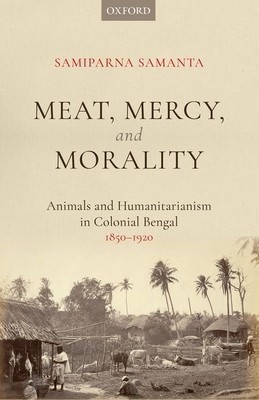
- We will send in 10–14 business days.
- Author: Samiparna Samanta
- Publisher: Oxford University Press, USA
- ISBN-10: 0190129131
- ISBN-13: 9780190129132
- Format: 14.9 x 22.3 x 2.3 cm, hardcover
- Language: English
- SAVE -10% with code: EXTRA
Reviews
Description
This book disentangles complex discourses around humanitarianism to understand the nature of British colonialism in India. It contends that the colonial project of animal protection in late nineteenth-century Bengal mirrored an irony. Emerging notions of public health and debates on cruelty
against animals exposed the disjunction between the claims of a benevolent Empire and a powerful imperial reality where the state constantly sought to discipline its subjects-both human and nonhuman. Centered around stories of animals as diseased, eaten, and overworked, the
book shows how such contests over appropriate measures for controlling animals became part of wider discussions surrounding environmental ethics, diet, sanitation, and the politics of race and class. The author
combines history with archive, arguing that colonial humanitarianism was not only an idiom of rule, but was also translated into Bengali dietetics, anxieties, vegetarianism, and vigilantism, the effect of which can be seen in
contemporary politics of animal slaughter in India.
EXTRA 10 % discount with code: EXTRA
The promotion ends in 17d.17:06:30
The discount code is valid when purchasing from 10 €. Discounts do not stack.
- Author: Samiparna Samanta
- Publisher: Oxford University Press, USA
- ISBN-10: 0190129131
- ISBN-13: 9780190129132
- Format: 14.9 x 22.3 x 2.3 cm, hardcover
- Language: English English
This book disentangles complex discourses around humanitarianism to understand the nature of British colonialism in India. It contends that the colonial project of animal protection in late nineteenth-century Bengal mirrored an irony. Emerging notions of public health and debates on cruelty
against animals exposed the disjunction between the claims of a benevolent Empire and a powerful imperial reality where the state constantly sought to discipline its subjects-both human and nonhuman. Centered around stories of animals as diseased, eaten, and overworked, the
book shows how such contests over appropriate measures for controlling animals became part of wider discussions surrounding environmental ethics, diet, sanitation, and the politics of race and class. The author
combines history with archive, arguing that colonial humanitarianism was not only an idiom of rule, but was also translated into Bengali dietetics, anxieties, vegetarianism, and vigilantism, the effect of which can be seen in
contemporary politics of animal slaughter in India.


Reviews